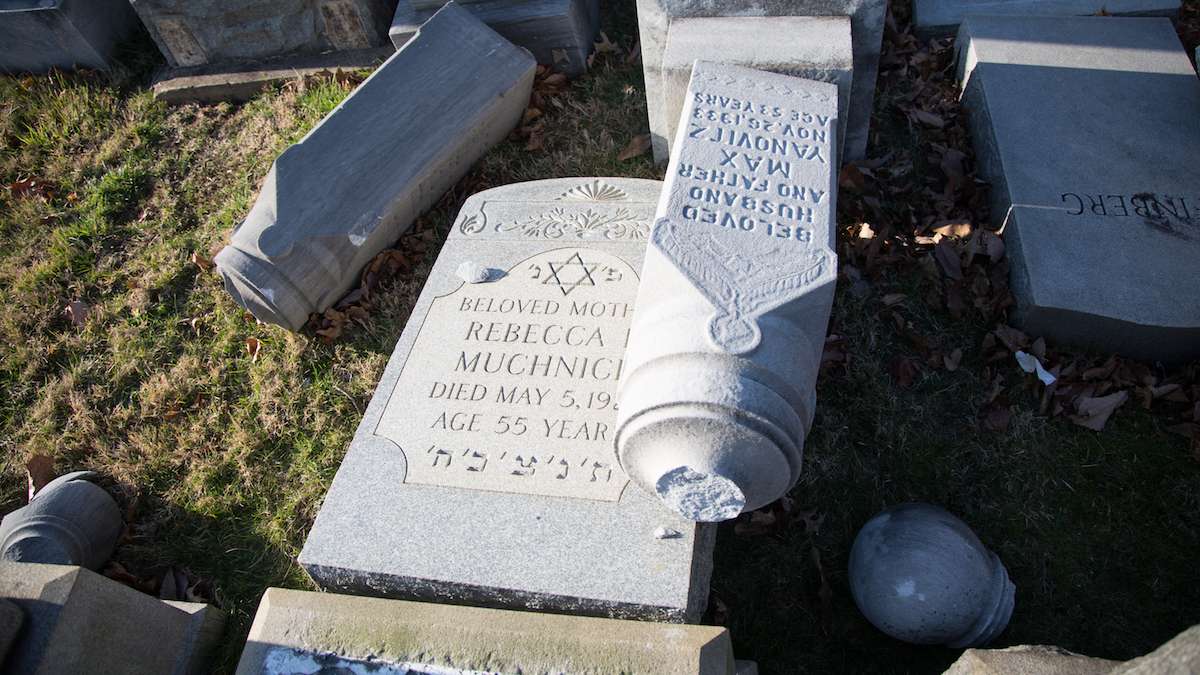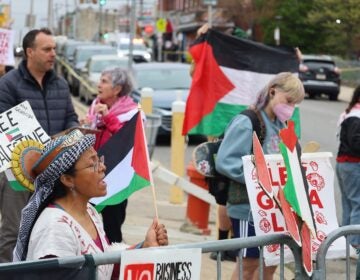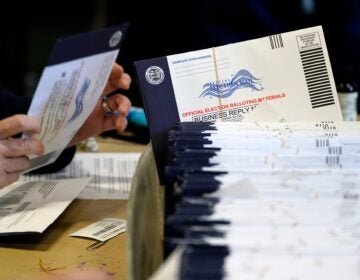U.S. lawmakers weigh in on wave of anti-Semitism
Listen
Widespread vandalism at the Mt. Carmel Jewish Cemetery in North East Philadelphia where hundreds of headstones were toppled and broken over night Sunday. (Emily Cohen for NewsWorks)
With hundreds of headstones toppled or broken at Jewish cemeteries in two states and waves of bomb scares called into Jewish centers, what can federal officials do to help stem this anti-Semitic tide?
In his first address to a joint session of Congress, the usually bombastic President Donald Trump turned heads when he condemned the desecration of hundreds of headstones in Jewish cemeteries as anti-Semitic.
“Recent threats targeting Jewish Community Centers and vandalism of Jewish cemeteries, as well as last week’s shooting in Kansas City, remind us that while we may be a nation divided on policies, we are a country that stands united in condemning hate and evil in all its forms,” Trump said.
Philadelphia’s Mount Carmel Cemetery rests in U.S. Rep. Bob Brady’s district. While he’s glad the president highlighted the incident, he said more must be done.
“No I didn’t think he did enough, I think he should’ve addressed it even more,” said Brady, a Democrat. “I think it’s a disgrace, vandals I think they’re cowards, it’s ridiculous to desecrate a cemetery like that, it’s really a shame that that would happen.”
Republicans see it differently. Congressman Ryan Costello who represents parts of four counties northwest of Philadelphia, said Trump showed leadership by addressing the attacks and threats in the opening moments of his speech.
“In terms of the president speaking about the issue, I felt the importance is in the fact that it was literally the first thing that he said rather than the duration that he spoke about,” Costello said. “Obviously, a joint address to Congress or a State of the Union, you only have so much time, and you have to touch on a lot of things. So, I commend him for raising it first off.”
Democrats accuse Trump and his top advisers of stoking hatred by trying to appeal to white nationalists. Critics point out White House chief strategist Steve Bannon used to run the online, far-right publication Breitbart News.
But Costello and other Republicans brush aside accusations that their party is a mouthpiece for white nationalists.
“I mean, I’ll tell you, I don’t think Breitbart ever really viewed me as an ally as a member of Congress, so I’m not here defending them or Bannon,” Costello said. “I just think that you have to allow a new administration to take shape, judge them by their policies.”
A call for preventive strategies
Besides the desecration of cemeteries, Jewish Community Centers across the region reported an uptick in bomb threats over the past few weeks and months.
A man who made the threats to vilify his ex-girlfriend is behind at least eight of the scores of those threats, federal authorities said Friday. Juan Thompson, 31, who was arrested in St. Louis, also is a suspect in a bomb threat to New York’s Anti-Defamation League.
Delaware U.S. Sen. Tom Carper was visiting a Jewish Community Center in Wilmington Monday when it was evacuated after receiving its third such threat.
He contacted FBI Director James Comey after the incident.
“Just to share with him what it was like to see all these kids hustled out of there to find safety, to senior citizens that had to be hustled out of there,” said Carper, a Democrat. “Just shared that with him and told him how important I thought that it was for them to do everything they could to get to the bottom of this.”
But what can the federal government do to combat this unsettling trend? Delaware’s other U.S. senator serves on the Judiciary Committee. Sen. Chris Coons said Congress has already given the executive branch broad authority to go after it.
“The Department of Justice has the legal authority, the staff, and the responsibility to investigate hate crimes and to push against them and to hold accountable those who commit crimes that are designed to terrorize religious minorities, racial minorities, or people who for whatever reason might be the subject of hate crimes,” said Coons, a Democrat.
Trump has called for a massive spending increase for the military that would be financed by cutting the budgets of other federal agencies, including the Justice Department.
Capitol lawmakers must resist calls to drastically rearrange the budget, Coons said.
“I am concerned that there are proposals for what might happen in our budget that would reduce the resources for investigation and enforcement against hate crimes and for the important work that the federal Department of Justice does in building community relations and in restoring a sense of hope,” he said.
Coons’ fellow Democratic Sen. Cory Booker of New Jersey said the administration needs to do more to combat hate of all stripes. And it must remain a nonpartisan issue.
“Frankly, I think we should be, as a nation, putting in better strategies to try to prevent this,” said Booker. “This is a serious law enforcement issue, a time that we should be pulling together and we shouldn’t politicize this left and right, talking out against this kind of hate.”
The president will release his formal budget outline in the coming weeks, and lawmakers from the region will be keeping their eyes out for any deep cuts proposed for Department of Justice.
WHYY is your source for fact-based, in-depth journalism and information. As a nonprofit organization, we rely on financial support from readers like you. Please give today.




